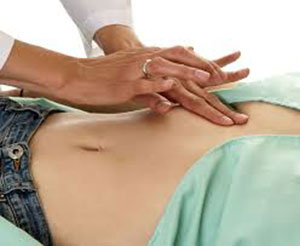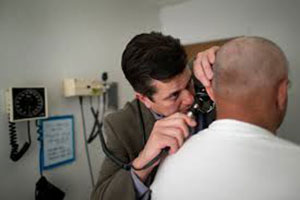—Can help find, prevent or delay health problems
‘PREVENTION is better than cure’ – one of those old sayings that can make a lot of sense when spoken in relation to health or sickness. It may be hard to find a person who wouldn’t  mind being sick; even in the least bit of not enjoying good health; the fear of having to be laid up in bed, needing people to constantly meet, even your very basic needs, is something most people would dread.
mind being sick; even in the least bit of not enjoying good health; the fear of having to be laid up in bed, needing people to constantly meet, even your very basic needs, is something most people would dread.
At public health institutions, where healthcare is most times free or subsidised, and where most of their healthcare facilities are being upgraded and becoming more available, there are still many people who would prefer to face-up to the rising cost of healthcare in the private institutions for whatever their needs are. Many highlight their busy work schedules and not having the time to “waste” to just sit and wait for very long periods to see the doctor at public institutions. However, regardless of where a person may go to have his or her regular medical checks, the fact is that such doctors’ visits can mean the difference between life and death.
Health Educator and Advocate
In a recent interview with Dr. Shawn Legall, a senior and very active doctor of the Georgetown Public Hospital Corporation, he advanced the view that, “Regular checks-up gives you the sense of how your body functions because a lot of people are unaware of what are abnormal signs of sickness in their bodies… So it gives you a chance to get familiar with your body. The other thing is that it’s a good opportunity for you and the doctor to have that one-to-one, because the doctor has functions too; because as a doctor he educates and advocates, so he, during that time has more of a one-to-one and it usually provides for some amount of counselling. So the doctor has the opportunity to give the patient information about health issues and follow-up; he also counsels the patient on dietary measures, weight-related issues and that  kind of stuff,” Dr. Legall said.
kind of stuff,” Dr. Legall said.
More prevalent non-communicable diseases
Dr. Legall, in further discourse on the matter of regular medical checks, urged that with a change in attitude of many more people, as it relates to their health, there will be less frequency of some of the more prevalent diseases.
“The other thing too is that for our population, diabetes and hypertension are two of the more prevalent non-communicable diseases and both of them – if you check on them, unless you are highly suspicious, it is very difficult to diagnose them because hypertension itself is asymptomatic (a condition or a person that shows no symptom). If you go and get actually tested that you hardly ever know. The other thing with diabetes is that most times when a person becomes diagnosed with diabetes it is already five, ten years in the making.
Pre-diabetic states
“So there are pre-diabetic states and during those states if the person is able to (what we say in medicine – nature/nurture), i.e. you are able to take corrective action, then the ill-effects can be delayed or avoided,” he said.
Dr. Legall explained that the pre-diabetic states are characterised by the presence of higher than normal blood glucose levels, even though it is not yet high enough to be classed as diabetes. Additionally, while diabetes develops very gradually, some of the symptoms such as the bathroom visits that are more frequent; feelings of being hungrier than normal; losing weight, despite eating more; being thirstier than normal; feeling more tired than usual, and some of the important signs that the disease might be present.
He further stated that people need not lose hope, since there are treatments that may stall diabetes from taking over the body. “This, as doctors would say, require ‘serious lifestyle changes’, which would include better eating, exercise, and possibly loosing some weight. However, with regular medical checks, the doctor will walk you through the necessary steps, while monitoring you along the way,” he reminded.
The other flip side
Dr. Legall went on to explain that while regular medical examinations are very important for the individual; there can sometimes be adverse effects for some people, who may receive (medical) information, which can be unnecessarily alarming.
“What some people get as a result of medical examinations is that it induces some anxiety in the patient; they become overly worried when they get knowledge of their physical/medical condition. The other thing too is that unnecessary exploration usually leads to unnecessary intervention and that is more pronounced when talking about prostate disease, where people may do a screening test. Otherwise, I think that is a very useful test for educating the patient and developing that rapport and allowing for confidence-building in patients, especially in the Guyanese situation,” Dr. Legall offered.
We limit our potential
“We limit our potential, in that most people may say that if you are 60 or 70, you have lived your ‘max’, but we know that that is not true in the world today; people’s ‘max’ would be a 100, a 100 – plus. “You could only reach those ‘max’ if you have taken certain corrective steps in life; if you don’t then you will ‘max out’ early,” the doctor emphasised.
Cancer
Medicine taught us that cancer is damage to the cells, the DNA. So, in order for cancer to be formed there is what is called pre-cancer changes in the cells, so there are pre-malignant changes, which can be shown by pap smears and other examinations, Dr. Legall said.
Clearly, regular health exams and tests can help find problems before they start. They can also help find these problems (if any) early, when the chances for treatment and cure are better. By getting the right health services, screenings, and treatments, people are taking steps that can certainly help their chances for living longer, healthier lives. The age of a person; their health and family history; lifestyle choices, for example, what is consumed, their physical and maybe in some cases mental activities – (whether he/she smokes), along with other important factors serve to make a difference in how often healthcare becomes a requirement for a person.
Studies have revealed and Dr. Legall has confirmed that there is a growing demand to continue educating physicians to be socially responsible. A physician’s place in society is closely tied to a moral sense of responsibility related to the agreed-on professional characteristics of physician -hood in society, the capacity to carry out that role, and the circumstances under which such professionals are called to account for failing to act appropriately according to that role. It is felt that the requirement for such social responsibility is a moral commitment and duty. mercilinburke2017@gmail.com



.jpg)








